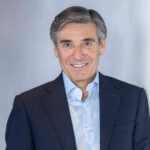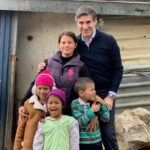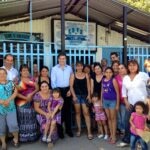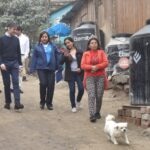Javier M. Flores: We are proud of helping millions of people improve their quality of life
The BBVA Microfinance Foundation (FMBBVA) is celebrating its anniversary. It was founded by BBVA in 2007 as a non-profit organization in the framework of the bank’s corporate social responsibility. With a €200 million endowment, FMBBVA aims to support people in situations of vulnerability with productive activities. In commemoration of this milestone, we spoke with Javier M. Flores, who has been the CEO of the foundation since 2010. With a law degree and MBA from the University of Houston (Texas, U.S.), he is in charge of strategy, executive management and supervision of the microfinance institutions in Latin America.
15 years later, FMBBVA is now the top foundation for its contributions to development in Latin America and second in the world, behind only the Bill and Melinda Gates Foundation, according to data published by the Organization for Economic Cooperation and Development (OECD).
Javier M. Flores is married with a teenage son. His relationship to Latin America is also personal, as his wife is Mexican. A sports fan, mainly of rugby and skiing, he transmits a sense of calmness and poise. He knows what he is talking about because he likes “to go to the field to check how the entrepreneurs we are supporting are progressing.” He gets excited when citing several women entrepreneurs by name. It must be because he knows for certain that what they do helps people born into poverty and exclusion “to have successful businesses and join the formal economy.”

Q: How would you explain the BBVA Microfinance Foundation to someone who doesn’t know what you do?
A: The BBVA Microfinance Foundation was created by the bank in the year 2007 when it was celebrating its 150th anniversary. At that time, BBVA wanted to step up and try to serve populations who didn’t have access to formal financial services, and who are socially and economically excluded. The foundation promotes the economic and social development of more vulnerable segments of the population who have all kinds of disadvantages. People who have a lot of skills, but lack resources to get ahead. And that is our role, to try to boost these capacities through financial services, capacity building and training. That is how we help people who were born into poverty and exclusion to be able to have successful businesses and join the formal economy.
Q.- Where do you think the success of your work lies?
A: The foundation’s success is being faithful to its founding principles - not having moved one inch from the purpose for which the institution was created, which is solely to promote the economic and social development of the most disadvantaged. And we have been consistent throughout the years, avoiding any temptation to move to different segments. Accompanying people who really need us, people who lack access to formal financial services. I think that has been the biggest factor, and that is what we try to promote in all of the foundation’s institutions.
Q.- You are the foundation that contributes the most to development in Latin America and the top foundation in the world for your contributions to gender equality. Some may not be aware of this and I think you have good reason to be proud. Can you explain?
A.- It really is impressive. We are number one in Latin America for contributions to development and the top foundation in the world for contributions to gender equality; this according to the OECD in its 2020 and 2021 reports. We are also second in the world in contributions to development, behind only the Bill and Melinda Gates Foundation.
The OECD has a working group that focuses on monitoring data and the contributions of all philanthropic groups that the organization. They do a comprehensive audit of the data including when you deliver, how much you contribute to development from a monetary standpoint. We joined in the year 2019 and in the 2020 statistics we had the results that you are describing. In 2021 we held the same positions.
And the good news - and this is news because the report hasn’t been released yet - is that in the report that will be published shortly, in 2022, we will once again be number one in Latin America. And I insist, we are not the ones who are saying this; it’s the OECD. And we are also second in the world for our contribution to development, which is very satisfying, fills us with pride and is really a very big responsibility.
Q:- Congratulations in advance for your continued success. You have also signed an agreement with the University of Oxford to apply the multidimensional poverty index to the private sector. Could you explain a little bit of what it entails?
A.- We have been learning over time since the foundation was created. We are seeing that poverty is not just monetary. It isn’t that you have an income level below your country’s poverty level. It is also reflected in deficiencies from a social perspective and in other hardships and deprivations, which is how the University of Oxford calls them - in education, health or housing. We try to really study what we do and the impact of our work to adapt our value proposition to the needs of these people. In this sense, the University of Oxford developed the multidimensional poverty index, which was adopted by the UN and over 100 countries to measure dimensions of poverty other than the monetary dimension.
We approached them, as we were interested in being able to measure the multidimensional poverty of our customers. We have a very good understanding of what the poverty characteristics of our entrepreneurs’ are from a monetary standpoint. We see their evolution over time. We are also able to see which customers are rural, urban, what education level they have, but we were missing more in-depth knowledge of their living conditions. Do they live in a home that has a roof, or just a sheet? What is the floor like? Is there an indoor bathroom? Do they have access to a basic healthcare system, an essential healthcare system, or no healthcare access at all? Many of them do not…
And we worked with the University of Oxford on adapting their algorithms and methodology for the first time as a private sector institution. They were stunned when they found out the level of depth with which we analyze the entrepreneurs. We recently put together a series of surveys in the five countries where the foundation is present to try to determine what the multidimensional level of poverty is like in aspects such as housing, education, health, and access to digitization and connectivity.
They are writing the report with this information. We put our entrepreneurs at their disposal so that they could ask them any questions they needed. We are going to have very thorough information on their living conditions. With this level of knowledge we will be able to compare what poor people are like and what deprivations they have compared to the average standard in each of the five countries. With this information we will be able to come up with specific proposals because we are going to be able to group the customers according to their levels of hardship. This University of Oxford report will be published and presented at the same university in June.
It will be a very important milestone because it will help us open the spectrum of what we do. We finance productive activities - businesses - but once the customers are included we have to put the focus on helping them improve their living conditions. And that is where this information becomes very valuable because we will have a value proposition to improve their homes, to help them have access to decent healthcare services, and also to be able to support not just their education, but that of their children. And of course, access to connectivity, to a level of digitization that allows them to join the 21st Century.
Q:- This year the BBVA Microfinance Foundation is celebrating its 15th anniversary. What are you most proud of?

Javier M. Flores, together with the Colombian entrepreneur Jéssica Hernández and her children, whom he visited at their home/workshop in Soacha.
A.- The truth is that we are most proud of helping millions of people improve their quality of life. It is our leitmotif. The main element. From an institutional standpoint, I would like to underscore several significant milestones. Since 2016, the foundation has had a consultative status at the United Nations Economic and Social Council. We are in this group of philanthropic institutions recognized by United Nations. I would also point out that the Organization of American States, through its foundation, The Trust for the Americas, recognized us in 2018 with the Corporate Citizen of the Americas Award for our work toward women empowerment in the region. And the third milestone you mentioned earlier, which is the recognitions by the OECD statistics service. I would call attention to these three points on an institutional level, but as I said, the awards and recognitions are great, but what really fulfills us is being able to do our part so that hundreds of thousands of people every day have the possibility of making their quality of life a little bit better. That is what really motivates us.
Q.- You really like to go to the field to see the foundation’s work in the places where you are established. What lessons have you learned from your work from a personal standpoint?
A.- When I joined the foundation, it was a completely unknown work to me. And the truth is, after so many years working, every time you go to the field, you always leave with lessons. The first is that they are very talented, skilled people. The only thing is that they had the misfortune of being born in a different environment, and therefore often lack the resources and education that they need. However, what we see that they do have is the ability to work hard and make sacrifices, well beyond what we understand; they are entrepreneurs out of necessity.
Today, 6 out of 10 of the Foundation's 2.8 million entrepreneurs are women.
When you give them confidence, they give it back to you. They most certainly pay their loans because their business and their families’ lives are there, in being able to pay their loans. And they are people that show courage, dignity and the desire to be successful with their example. They all have dreams. They have dreams just like us, and we can support them with training, education, support over time, with loans, but also with savings, etc. Teaching them the reason why it’s good to save, and that with financial health, they improve.
They dream of their children having a much better quality of life than they have had. I talk about it and I get goosebumps. What I have seen in the hundreds of faces of thankful, satisfied people who are proud of being able to give their children a better life is really impressive. And that is very, very emotional. It’s really touching, and really affects you. It definitely affects you.
Q.- And of all those people, did anyone make you say “Wow, That’s awesome! How did they do that?”
A.- I could tell you about a whole bunch of examples that I knew first-hand. For example, Diana, a Dominican entrepreneur and a leader in her community, runs a banana cooperative. She grows and even exports bananas. In 2018, she received a visit from Queen Letizia of Spain, who was able to see first-hand the cooperative and the group of women who work there. She has become a local celebrity thanks to her business success and the Queen's visit.

The CEO of the BBVAMF with entrepreneurs from Fondo Esperanza, the Chilean entity of the Fundación.
Another story is that of Rosa Ancco, a Peruvian woman who lived in a very humble house—with a tin roof—as a single mother of two young children, 5 and 7 years old. They didn’t have a bathroom. We financed the construction of a bathroom. When she showed it to us, she was in tears as she told us how overjoyed she was to see her children under the shower, now able to wash themselves with running water. You would have to be made of stone not to react to this.
Or the case of Yamile, in Colombia, whose mother was abandoned by her husband when she was pregnant with her. She is now an entrepreneur. She started teaching sewing lessons when she was very young. And this girl, who is still very young at just over 30 years old, has a sewing workshop with more than 100 people sewing for her. She began by recycling fabric thrown away by textile companies: she collected them from the garbage and made children's dresses, which she sold in the market. Now she produces crops industrially for shopping malls.
Some female entrepreneurs engage in organic farming, growing tomatoes and other vegetables. We have trained them to apply environmentally sustainable techniques. I have visited some of these small-scale women farmers on several occasions and it is very impressive to see their progress, how grateful they are, and at the same time the strength and drive they have.
Any of the stories I could tell you are an example for everyone.
Q.- I like the fact that you gave examples of women entrepreneurs. How do you work on diversity at the Foundation?
A.- We reached diversity by working against unfairness and inequality. Our experience in the Americas tells us that women start with a huge disadvantage compared to men. By our very nature, as we seek to promote development among the most vulnerable people, we encountered women as a vulnerable group. In addition, women entrepreneurs have a very special characteristic: they are often single mothers who have to make time to run a small business while taking care of their kids. Today, more than 60% of the Foundation's 2.8 million customers are women.
When we talk about diversity in Latin America, you also have minorities, such as the wayuu in Colombia and ethnic minorities in Peru, in the Cuzco area. We have hired minority employees so that they can serve the people of their community, who are not always Spanish-speaking. We have also started to work with migratory flows, mainly of Venezuelans. Millions of people have moved south to Colombia, Peru, and Chile, and have also moved to the Dominican Republic and Panama. When none of the banks in those countries wanted to serve these people—who were stigmatized, who had no papers—we were the first financial institution to provide service to Venezuelan migrants in Colombia. This year we will also do so in Peru, Panama and the Dominican Republic.

Visit in San Juan de Lurigancho, a district of Lima, to the Peruvian entrepreneur Elisa Cuchupoma.
Q.- Finally, Javier, what are the challenges for the future of the BBVA Microfinance Foundation and how do you imagine it in another 15 years?
A.- The challenges we face at the Foundation are to reach more people, increase our scale, and expand our outreach to embrace poorer customers. What is key here is that we follow the process that we started a few years ago of digital transformation of institutions, which is enabling us to have a better relationship and awareness of poorer people, while never forgetting that a relationship of trust is built from person to person. We have to be able to give them a service that is multichannel. In addition, digitalization makes you more efficient, which is a core issue when you want to reach poorer people. We need to come up with even smaller loans than those we already grant and do so in a sustainable way, but it’s tough. Digitalization will enable us to become much more efficient, which is a must-have to be able to continue exploring below the poverty level.
And in fifteen years I see the Foundation serving more than 10 million families. I aspire and hope to be in more than five countries, to widen the scope of the Foundation. And of course, we have to be a leading institution worldwide that contributes with social reputation to the founder, BBVA, delivering through outstanding work the best doses of reputation. Our goal is to be a technologically advanced operator that works towards gender equity and environmental sustainability. We will be an institution with open arms for all those who have difficulty accessing financial services.